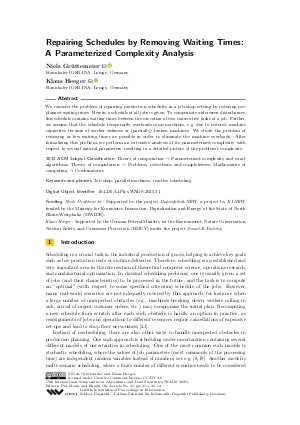Repairing Schedules by Removing Waiting Times: A Parameterized Complexity Analysis
Authors
Niels Grüttemeier  ,
Klaus Heeger
,
Klaus Heeger 
-
Part of:
Volume:
19th International Symposium on Algorithms and Data Structures (WADS 2025)
Part of: Series: Leibniz International Proceedings in Informatics (LIPIcs)
Part of: Conference: Algorithms and Data Structures Symposium (WADS) - License:
 Creative Commons Attribution 4.0 International license
Creative Commons Attribution 4.0 International license
- Publication Date: 2025-08-29
File

PDF
LIPIcs.WADS.2025.31.pdf
- Filesize: 0.7 MB
- 14 pages
Document Identifiers
Subject Classification
ACM Subject Classification
- Theory of computation → Parameterized complexity and exact algorithms
- Theory of computation → Problems, reductions and completeness
- Mathematics of computing → Combinatorics
Keywords
- Job shop
- parallel machines
- reactive scheduling
Metrics
- Access Statistics
-
Total Accesses (updated on a weekly basis)
0PDF Downloads0Metadata Views
Abstract
We consider the problem of repairing production schedules in a job-shop setting by reducing pre-planned waiting times. Herein, a schedule of all jobs is given. To compensate unforeseen disturbances, this schedule contains waiting times between the execution of two consecutive tasks of a job. Further, we assume that the schedule temporarily overloads some machines, e.g. due to reduced machine capacities because of worker sickness or (partially) broken machines. We study the problem of removing as few waiting times as possible in order to eliminate the machine overloads. After formalizing this problem, we perform an extensive analysis of its parameterized complexity with respect to several natural parameters, resulting in a detailed picture of the problem’s complexity.
Cite As Get BibTex
Niels Grüttemeier and Klaus Heeger. Repairing Schedules by Removing Waiting Times: A Parameterized Complexity Analysis. In 19th International Symposium on Algorithms and Data Structures (WADS 2025). Leibniz International Proceedings in Informatics (LIPIcs), Volume 349, pp. 31:1-31:14, Schloss Dagstuhl – Leibniz-Zentrum für Informatik (2025)
https://doi.org/10.4230/LIPIcs.WADS.2025.31
BibTex
@InProceedings{gruttemeier_et_al:LIPIcs.WADS.2025.31,
author = {Gr\"{u}ttemeier, Niels and Heeger, Klaus},
title = {{Repairing Schedules by Removing Waiting Times: A Parameterized Complexity Analysis}},
booktitle = {19th International Symposium on Algorithms and Data Structures (WADS 2025)},
pages = {31:1--31:14},
series = {Leibniz International Proceedings in Informatics (LIPIcs)},
ISBN = {978-3-95977-398-0},
ISSN = {1868-8969},
year = {2025},
volume = {349},
editor = {Morin, Pat and Oh, Eunjin},
publisher = {Schloss Dagstuhl -- Leibniz-Zentrum f{\"u}r Informatik},
address = {Dagstuhl, Germany},
URL = {https://drops.dagstuhl.de/entities/document/10.4230/LIPIcs.WADS.2025.31},
URN = {urn:nbn:de:0030-drops-242624},
doi = {10.4230/LIPIcs.WADS.2025.31},
annote = {Keywords: Job shop, parallel machines, reactive scheduling}
}
Author Details
Funding
- Grüttemeier, Niels: Supported by the project Datenfabrik.NRW, a project by KI.NRW, funded by the Ministry for Economics, Innovation, Digitalization and Energy of the State of North Rhine-Westphalia (MWIDE).
- Heeger, Klaus: Supported by the German Federal Ministry for the Environment, Nature Conservation, Nuclear Safety and Consumer Protection (BMUV) under the project Smart-E-Factory.
References
- Alessandro Agnetis, Jean-Charles Billaut, Michael Pinedo, and Dvir Shabtay. Fifty years of research in scheduling – Theory and applications. European Journal of Operational Research, 2025. URL: https://doi.org/10.1016/j.ejor.2025.01.034.
- Susanne Albers and Günter Schmidt. Scheduling with unexpected machine breakdowns. Discret. Appl. Math., 110(2-3):85-99, 2001. URL: https://doi.org/10.1016/S0166-218X(00)00266-3.
- Kaja Balzereit, Niels Grüttemeier, Nils Morawietz, Dennis Reinhardt, Stefan Windmann, and Petra Wolf. Scalable neighborhood local search for single-machine scheduling with family setup times. CoRR, abs/2409.00771, 2024. URL: https://doi.org/10.48550/arXiv.2409.00771.
- Nicolas Boria and Federico Della Croce. Reoptimization in machine scheduling. Theor. Comput. Sci., 540:13-26, 2014. URL: https://doi.org/10.1016/J.TCS.2014.04.004.
- Marek Cygan, Fedor V. Fomin, Lukasz Kowalik, Daniel Lokshtanov, Dániel Marx, Marcin Pilipczuk, Michal Pilipczuk, and Saket Saurabh. Parameterized Algorithms. Springer, 2015. URL: https://doi.org/10.1007/978-3-319-21275-3.
- Michael Dom, Daniel Lokshtanov, and Saket Saurabh. Kernelization lower bounds through colors and ids. ACM Trans. Algorithms, 11(2):13:1-13:20, 2014. URL: https://doi.org/10.1145/2650261.
- M. R. Garey, David S. Johnson, and Larry J. Stockmeyer. Some simplified NP-complete graph problems. Theor. Comput. Sci., 1(3):237-267, 1976. URL: https://doi.org/10.1016/0304-3975(76)90059-1.
-
Kevin D Glazebrook. Scheduling tasks with exponential service times on parallel processors. J. Appl. Probab., 16(3):685-689, 1979.

- Hendrik W. Lenstra Jr. Integer programming with a fixed number of variables. Math. Oper. Res., 8(4):538-548, 1983. URL: https://doi.org/10.1287/MOOR.8.4.538.
- Bala Kalyanasundaram and Kirk Pruhs. Fault-tolerant scheduling. SIAM J. Comput., 34(3):697-719, 2005. URL: https://doi.org/10.1137/S0097539794261799.
- Richard M. Karp. Reducibility among combinatorial problems. Complexity of Computer Problems, pages 85-103, 1972. URL: https://doi.org/10.1007/978-1-4684-2001-2_9.
-
Bernhard Korte and Jens Vygen. Combinatorial Optimization. Springer, 6th edition, 2018.

- Patricio Lamas, Marcos Goycoolea, Bernardo K. Pagnoncelli, and Alexandra M. Newman. A target-time-windows technique for project scheduling under uncertainty. Eur. J. Oper. Res., 314(2):792-806, 2024. URL: https://doi.org/10.1016/J.EJOR.2023.10.027.
- Arthur Müller and Lukas Vollenkemper. Reinforcement learning as an improvement heuristic for real-world production scheduling. In Proceedings of the 23rd IEEE International Conference on Machine Learning and Applications (ICMLA '21). IEEE, 2024. URL: https://doi.org/10.1109/ICMLA52953.2021.00085.
- Krzysztof Pietrzak. On the parameterized complexity of the fixed alphabet shortest common supersequence and longest common subsequence problems. J. Comput. Syst. Sci., 67(4):757-771, 2003. URL: https://doi.org/10.1016/S0022-0000(03)00078-3.
- George A. Rovithakis, Stelios E. Perrakis, and Manolis A. Christodoulou. Application of a neural-network scheduler on a real manufacturing system. IEEE Trans. Control. Syst. Technol., 9(2):261-270, 2001. URL: https://doi.org/10.1109/87.911378.
- Markus W. Schäffter. Scheduling with forbidden sets. Discret. Appl. Math., 72(1-2):155-166, 1997. URL: https://doi.org/10.1016/S0166-218X(96)00042-X.
- Dvir Shabtay and Miri Gilenson. A state-of-the-art survey on multi-scenario scheduling. Eur. J. Oper. Res., 310(1):3-23, 2023. URL: https://doi.org/10.1016/J.EJOR.2022.11.014.
- Martin Skutella, Maxim Sviridenko, and Marc Uetz. Unrelated machine scheduling with stochastic processing times. Math. Oper. Res., 41(3):851-864, 2016. URL: https://doi.org/10.1287/MOOR.2015.0757.
-
Stephen F Smith. Reactive scheduling systems. Intelligent scheduling systems, pages 155-192, 1995.

-
V Subramaniam, AS Raheja, and K Rama Bhupal Reddy. Reactive repair tool for job shop schedules. Int. J. Prod. Res., 43(1):1-23, 2005.

- E. Szelke and G. Markus. A blackboard based perspective of reactive scheduling. In Artificial Intelligence in Reactive Scheduling, pages 60-77. Springer US, 1995. URL: https://doi.org/10.1007/978-0-387-34928-2_6.
-
Vadim G Vizing. On an estimate of the chromatic class of a p-graph. Diskret. analiz., 3:25-30, 1964.

